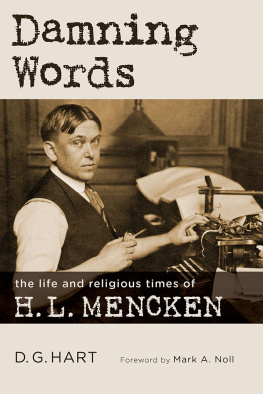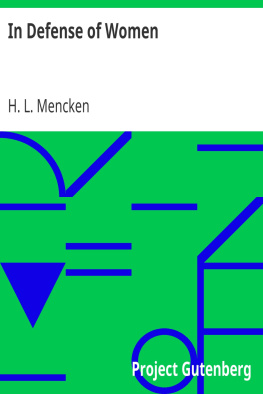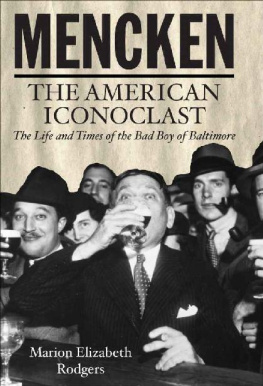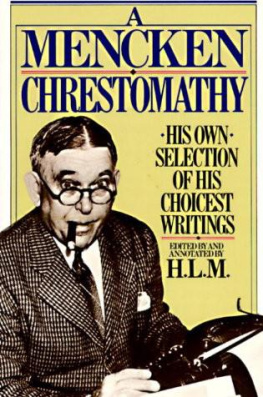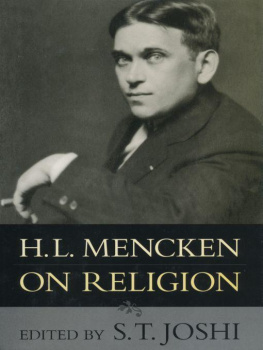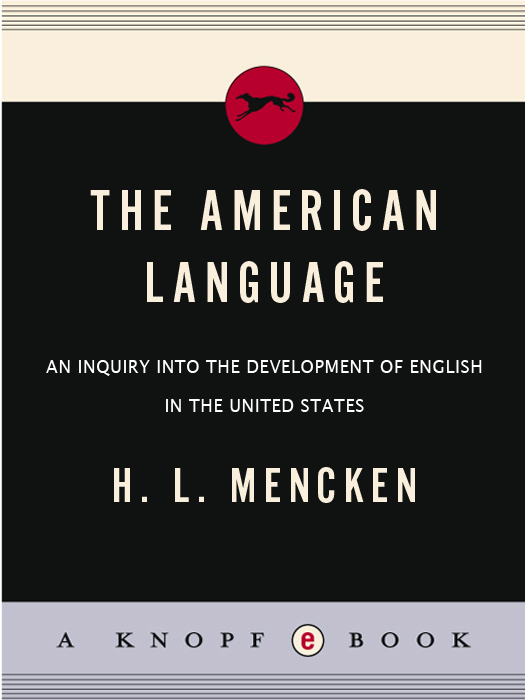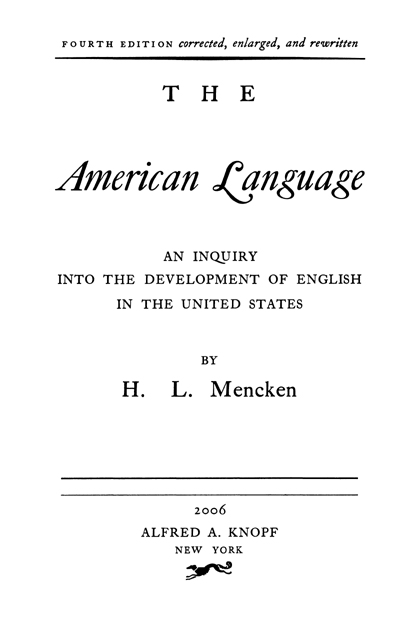BOOKS BY HLMENCKEN
THE AMERICAN LANGUAGE
THE AMERICAN LANGUAGE: Supplement I
THE AMERICAN LANGUAGE: Supplement II

A NEW DICTIONARY OF QUOTATIONS
TREATISE ON THE GODS
CHRISTMAS STORY
A MENCKEN CHRESTOMATHY (with selections from the Prejudices series, A Book of Burlesques, In Defense of Women, Notes on Democracy, Making a President, A Book of Calumny, Treatise on Right and Wrong, with pieces from the American Mercury, Smart Set, and the Baltimore Evening Sun, and some previously unpublished notes)
MINORITY REPORT: H. L. MENCKENS NOTEBOOKS
THE BATHTUB HOAX and Other Blasts and Bravos from the Chicago Tribune
LETTERS OF H. L. MENCKEN, selected and annotated by Guy J. Forgue
H. L. MENCKEN ON MUSIC, edited by Louis Cheslock
THE AMERICAN LANGUAGE: The Fourth Edition and the Two Supplements, abridged, with annotations and new material, by Raven I. McDavid, Jr., with the assistance of David W. Maurer
H. L. MENCKEN: THE AMERICAN SCENE, A READER , selected and edited, with an introduction and commentary, by Huntington Cairns
These are BORZOI BOOKS , published by ALFRED A. KNOPF in New York
Copyright 1919, 1921, 1923, 1936 by Alfred A. Knopf, Inc. Copyright renewed 1947, 1949, 1950 by H. L. Mencken. Copyright renewed 1963 by August Mencken and Mercantile-Safe Deposit and Trust Company. All rights reserved under International and Pan-American Copyright Conventions. Published in the United States by Alfred A. Knopf, Inc., New York, and in Canada by Random House of Canada Limited, Toronto.
PUBLISHED March, 1919
REVISED EDITION published December, 1921
THIRD EDITION again revised published February, 1923
FOURTH EDITION corrected, enlarged, and rewritten
Published April, 1936
Reprinted Twenty-six Times
Twenty-eighth Printing, May 2006
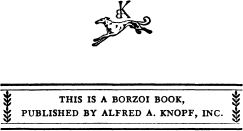
eISBN: 978-0-307-80879-0
v3.1
PREFACE
TO THE FOURTH EDITION
The first edition of this book, running to 374 pages, was published in March, 1919. It sold out very quickly, and so much new matter came in from readers that a revision was undertaken almost at once. This revision, however, collided with other enterprises, and was not finished and published until December, 1921. It ran to 492 pages. In its turn it attracted corrections and additions from many correspondents, and in February, 1923, I brought out a third edition, revised and enlarged. This third edition has been reprinted five times, and has had a large circulation, but for some years past its mounting deficiencies have been haunting me, and on my retirement from the editorship of the American Mercury at the end of 1933 I began to make plans for rewriting it. The task turned out to be so formidable as to be almost appalling. I found myself confronted by a really enormous accumulation of notes, including hundreds of letters from correspondents in all parts of the world and thousands of clippings from the periodical press of the British Empire, the United States and most of the countries of Continental Europe. Among the letters were many that reviewed my third edition page by page, and suggested multitudinous additions to the text, or changes in it. One of them was no less than 10,000 words long. The clippings embraced every discussion of the American language printed in the British Empire since the end of 1922 at all events, every one that the singularly alert Durrant Press-Cutting Agency could discover. Furthermore, there were the growing files of American Speech, set up in October, 1925, and of Dialect Notes, and a large number of books and pamphlets, mostly in English but some also in German, French and other foreign languages, including even Japanese. It soon became plain that this immense mass of new material made a mere revision of the third edition out of the question. What was needed was a complete reworking, following to some extent the outlines of the earlier editions, but with many additions and a number of emendations and shortenings. That reworking has occupied me, with two or three intervals, since the beginning of 1934. The present book picks up bodily a few short passages from the third edition, but they are not many. In the main, it is a new work.
The reader familiar with my earlier editions will find that it not only presents a large amount of matter that was not available when they were written, but also modifies the thesis which they set forth. When I became interested in the subject and began writing about it (in the Baltimore Evening Sun in 1910), the American form of the English language was plainly departing from the parent stem, and it seemed at least likely that the differences between American and English would go on increasing. This was what I argued in my first three editions. But since 1923 the pull of American has become so powerful that it has begun to drag English with it, and in consequence some of the differences once visible have tended to disappear. The two forms of the language, of course, are still distinct in more ways than one, and when an Englishman and an American meet they continue to be conscious that each speaks a tongue that is far from identical with the tongue spoken by the other. But the Englishman, of late, has yielded so much to American example, in vocabulary, in idiom, in spelling and even in pronunciation, that what he speaks promises to become, on some not too remote tomorrow, a kind of dialect of American, just as the language spoken by the American was once a dialect of English. The English writers who note this change lay it to the influence of the American movies and talkies, but it seems to me that there is also something more, and something deeper. The American people now constitute by far the largest fraction of the English-speaking race, and since the World War they have shown an increasing inclination to throw off their old subservience to English precept and example. If only by the force of numbers, they are bound to exert a dominant influence upon the course of the common language hereafter. But all this I discuss at length, supported by the evidence now available, in the pages following.
At the risk of making my book of forbidding bulk I have sought to present a comprehensive conspectus of the whole matter, with references to all the pertinent literature. My experience with the three preceding editions convinces me that the persons who are really interested in American English are not daunted by bibliographical apparatus, but rather demand it. The letters that so many of them have been kind enough to send to me show that they delight in running down the by-ways of the subject, and I have tried to assist them by setting up as many guide-posts as possible, pointing into every alley as we pass along. Thus my references keep in step with the text, where they are most convenient and useful, and I have been able to dispense with the Bibliography which filled 32 pages of small type in my third edition. I have also omitted a few illustrative oddities appearing in that edition for example, specimens of vulgar American by Ring W. Lardner and John V. A. Weaver, and my own translations of the Declaration of Independence and Lincolns Gettsyburg Address. The latter two, I am sorry to say, were mistaken by a number of outraged English critics for examples of Standard American, or of what I proposed that Standard American should be. Omitting them will get rid of that misapprehension and save some space, and those who want to consult them will know where to find them in my third edition.



